Cultivation of meat breeds of hens considered quite a profitable and low-cost businesswhich is resorted to both by farmers in small subsidiary farms and by owners of large poultry farms. Most of the meat crosses most popular for breeding, suitable for slaughter mass gain in the first two or four months of age, which is why the cost of food is not very long. In addition, broilers are more enduring, the level of resistance to disease is higher than that of other varieties of chickens. However, it often happens that broilers start falling to their feet. Why is this happening and what to do in such situations?
Table of contents
- Why broiler chickens and chickens fall to their feet, possible causes
- Self-solution to the problem, what to do and how to treat
- Youngsters get on their feet, paws disperse: disease prevention
- Emergency assistance to chicks aged 10-15 days
- Treatment of monthly broilers
- Treatment of adults
- Preventive measures so that chicks do not die
Why broiler chickens and chickens fall to their feet, possible causes
More often chickens fall to their feet solely through the fault of the owner, and only in rare cases can the disease be caused. The most common factors of this phenomenon are associated with violations committed in the process of keeping birds. Chick content - the business is not only profitable, but also requires a responsible approach from the very beginning, from the moment of purchase of chicks. Basic mistakes that breeders make when breeding young animals:
- Unsuitable conditions of detention. When finding an increased number of heads in a room with a limited area, very often the chicks begin to fall on their feet. Of course, chickens are kept in cages, but nobody canceled the density of landing, and the recommended density of the number of heads per square meter between the ages of birth and one month should not exceed 30.At older ages, chicks are placed at the rate of no more than 10 animals per square meter.
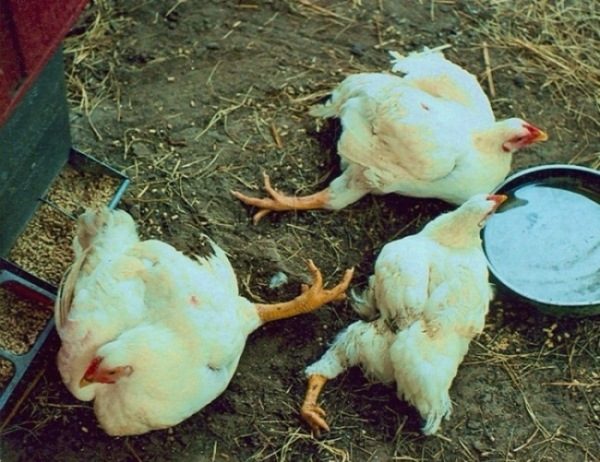
- Vitamin deficiency or lack of minerals. If the rules of feeding are not followed and the feedstock of the hen is insufficiently balanced, the nutrients necessary for the growing organism will be less than that. As a result, the paws disperse and are taken away.
- Rickets. Rickets develops due to a lack of vitamin D. Simply put, chickens simply do not have enough sunlight to synthesize this vitamin.
- Diseases. Many diseases that chickens can be exposed toOne of the main symptoms are falling birds on their feet. In this case, only a qualified veterinarian can determine the cause.
In the event that, from a medical point of view, the reasons for such a condition are not found, you can help the bird yourself.
Self-solution to the problem, what to do and how to treat
In order to find a way out, you should analyze the situation.For example, if it is clear that the degree of planting density is more than acceptable, then, most likely, the reason lies precisely in this. If a In order to save the chicks were given cheap food without vitamin supplements., the behavior of the bird can be attributed to the lack of nutrients in the body. Finally if livestock kept in a dark room without access to the sunperhaps the cause is rickets. Measures that can be taken in such cases:
- Add crushed shells to feed, shell from under the eggs, chalk, thus enriching the diet with calcium.
- Add greens to food. Herbs have a high content of vitamins required by broilers for active growth and maintenance of immunity. Chicks begin to give finely chopped green after three days after birth. Initially the amount of greens should not exceed one tenth of the total feed intakeGradually, the amount of grass is reduced to ½. Excellent for chicks finely chopped nettle.
- Desirable to transfer birds to feed. Specialized combined feed is optimal in its composition and well absorbed by the bird.
Youngsters get on their feet, paws disperse: disease prevention
The condition when the young broilers can not hold on to their own paws, it is easier to prevent than to look for causes and take urgent measures. For the normal development of chicks, a number of factors are important:
- Compliance population density.
- Compliance temperature conditions.
- Security fresh water and balanced nutrition.
- Compliance clean house.
- Security ventilation and lighting in the house.
It is very important that the coop was not only moderately clean, but the necessary amount of light was present, there was no mold, the room was well ventilated. This should avoid drafts. Just hatched kids at first need additional heating around 27-32 degrees. Because of the low temperature, the chicks sit on their feet and die.
Feeding young stock is desirable to carry out the feed from the first days. This will avoid problems associated with vitamin deficiency and as a result, the fall of the bird on its feet. If it is impossible to feed broilers with ready-made combined feeds, it is necessary to independently enrich the diet with vitamins and minerals. For this already daily chicks Fish oil is added to the mash, chopped greens are mixed on the third day, on the fifth day of life add to the diet of vegetables, then feed enriched with calcium using chalk, bone meal and small shells.
Emergency assistance to chicks aged 10-15 days
Experienced farmers say that vodka helps to get babies younger than a month on their feet. The method is common for a long time, widely used by people from time immemorial. If the chick fell on its paws and does not want to get up, it simply put a few drops of vodka in the beakafter which the baby soon rises, his appetite wakes up. The method is controversial, causing a number of questions, but, according to those who used this technique, is very effective.
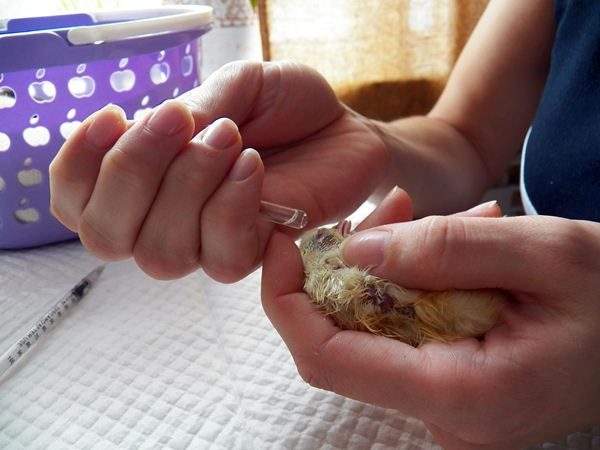
Treatment of monthly broilers
At the age of one month, the condition of broiler chickens, when they cannot keep their feet, is most often caused by rickets, unless there is a serious infectious disease behind it. Treat young animals with the addition of tricalcium phosphate in food, as well as fish oil or synthetic vitamin D3.In the absence of serious reasons that caused the inability of the birds to stay on their own paws, tricalcium phosphate, due to the content of phosphorus and calcium, in a short time has a beneficial effect on the body of birds. Tricalcium phosphate is added at a dosage of 2% of the total weight of the daily feed.
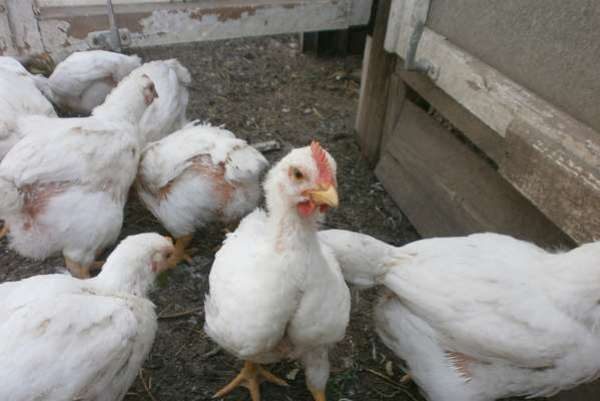
Treatment of adults
Older birds often cause arthritis of the joints to prevent chickens from holding on to their paws. For treatment, ampicillin is used at the rate of 15-20mg / 1 kg of body weight.. You can add the drug in food or water for 5 days. Treatment is carried out only if it is reliably known that the condition of the broilers is due precisely to arthritis. An accurate diagnosis, establish the causes and recommend treatment can only be a veterinarian.
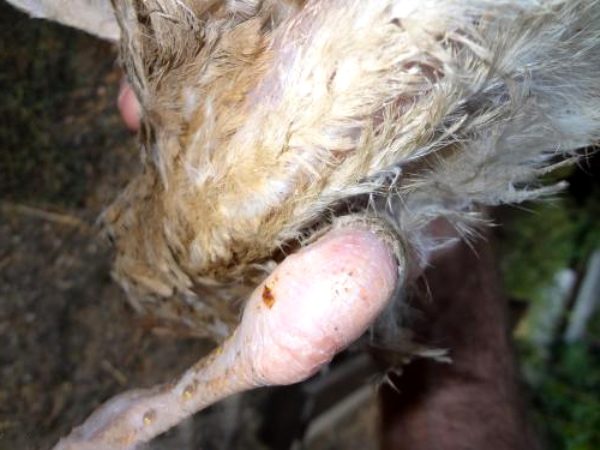
Preventive measures so that chicks do not die
The main factor in avoiding chick settling on the paws is competent approach to broiler farming with all the details. Proper care, good nutrition, adherence to standards and timely preventive measures can prevent mortality,ensuring high profitability of breeding domestic poultry.
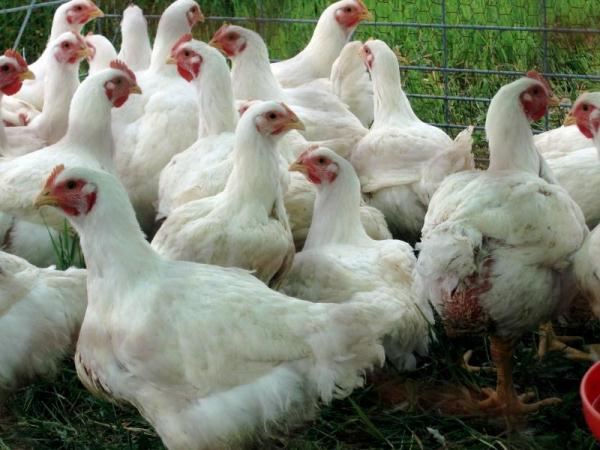
And adult birds can fall to their feet from the fact that they are simply fed. After all, broilers, as you know, are gaining weight until a certain point and can even, if they are overfeeding, die.
For a long time I lived in a village and at home there was a large household. They also grew a bird. I remember my mother-in-law adding cottage cheese to an egg to small chickens and boiled an egg boiled through a grater.
How often can Chiktonik be used?